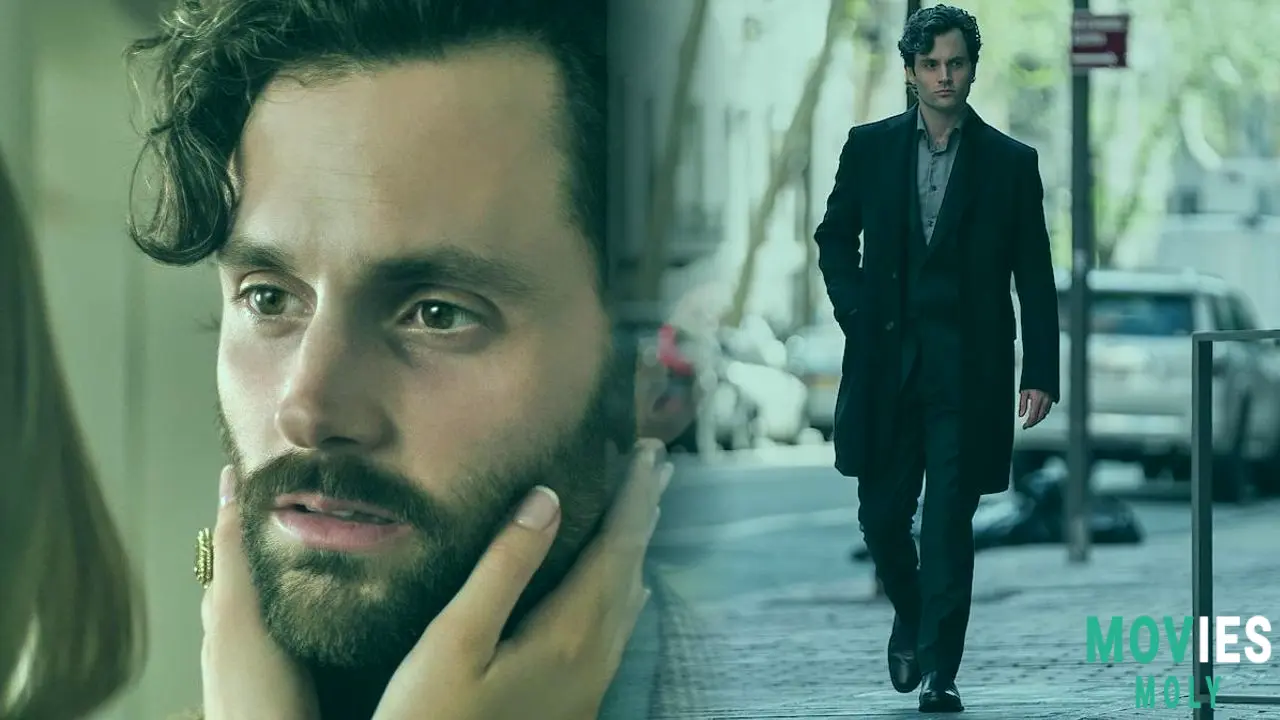Warning: This article contains major spoilers from the final season of Netflix’s You.
For five seasons, Netflix’s You toyed with audience perception, letting viewers slip into the warped psyche of Joe Goldberg—a charming, obsessive, and murderous protagonist who somehow managed to hold their attention, and even their sympathy. But in the show's final chapter, creators Michael Foley and Justin W. Lo pulled off a masterstroke of meta storytelling, and it came in the form of one character: Bronte.
Played with sharp edge and emotional complexity by Madeline Brewer, Bronte isn’t just Joe’s (Penn Badgley) final love interest—she’s his (and our) reckoning. Initially presented as another one of Joe’s inevitably doomed obsessions, Bronte subverts the familiar cycle so expertly that the show itself flips the genre on its head in its last season.
Bronte’s role in Season 5 was designed to bait and then shatter audience expectations“We were so insecure about the idea of starting a fifth season with Joe laying eyes on a new girl,” Foley admitted in a Slate interview, “that we thought the audience would say, ‘We know how this ends.’” The writers even considered revealing Bronte’s true agenda—that she was catfishing Joe and was aware of his deadly past—from the very first episode. Instead, they trusted the character (and the story) enough to let the twist breathe. And breathe it did.
Bronte is never just a stand-in for “the next victim.” She’s calculated, aware, and intent on exposing Joe. But the brilliance of her character is that she doesn’t simply outsmart him. She mirrors him. As the writers put it, “We were in the writers’ room saying, ‘Let’s just have Joe fall in love with Joe.’” And that’s exactly what happens. She adopts the persona that Joe would inevitably be drawn to—a vulnerable, introspective femme fatale—and then evolves into someone who writes dark romance, just like Joe lashes into genre writing in her presence.
She’s an embodiment of the audience’s toxic fascination with Joe

What makes Bronte truly meta is how she reflects not only Joe’s manipulation but the show’s own audience. She loves Joe at first, just as viewers have across five seasons. But she also *loves* the show’s genre language, its trope subversion, and its psychological dance. She’s literally the fan inside the story, and that’s never more clear than in the finale, when she says:
“The fantasy of a man like you is how we cope with the reality of a man like you.”That line isn’t just for Joe. It’s for us. For everyone who cheered Joe on, who stuck around despite knowing he was stalking, lying, and killing. Bronte doesn’t just expose Joe—she exposes the illusion of redemption we’ve been willing to entertain. She’s the in-universe equivalent of a Screen Rant deep dive, calling out the uncomfortable truth behind our engagement with the character.
The final confrontation with Bronte is as visceral as it is symbolic

Their last encounter in the woods is pure grim poetry. Shot with a deliberate restraint that still manages to punch through—Foley called it “pulling no punches”—the fight between Joe and Bronte shows Joe at his most animalistic (shirtless, bloodied, desperate) and Bronte as the cold, calculated force of reality. It’s a role reversal straight out of a comic book climax, where the anti-hero finally meets a protagonist who refuses to be gaslit into submission.
And yet, even in that moment, there's a haunting emotional pull. Bronte says, “I’m not supposed to feel this way about you,” and we understand that this isn't just about survival—it's about breaking the cycle. She wants to *feel* something different, but she’s aware enough to know that feeling for Joe is just another form of entrapment.
Her name, her identity, and her mission turn into a form of wish fulfillment

Slate’s Sam Adams noted that the writers toyed with the idea of ending the series with Bronte writing the final story. And in a way, that’s exactly what happens. After deleting Joe’s edits from Beck’s novel and giving her back the voice he stole, Bronte crafts an ending where the women win, where Joe is defeated not by death, but by exposure and isolation.
Kate survives the basement fire, Marienne thrives as an artist, Nadia publishes her work, and Beck’s original version of The Dark Face of Love soars without Joe’s ego-stained footnotes. It’s fantasy. It’s justice. It’s the ending that Bronte—and the audience—wants to read. And she *allows* herself to be the author of that narrative, even if it means letting Joe believe he has control one last time.
Bronte isn’t just a character—she’s the thematic embodiment of You’s final season

Throughout its run, You has played with genre conventions, audience complicity, and the seductive nature of storytelling. Bronte takes all of that and crystallizes it into one persona. She’s the feminist critique, the trope subverter, the true-crime enthusiast who becomes what she hunts. She’s the reflection of Joe’s (and by extension, our) need to categorize, manipulate, and narrativize reality.
And in the end, when Joe is left in a cell with no power, no freedom, and no dignity—reading a fan letter and speaking directly to us one last time—it's Bronte's work that makes that final monologue land. She's not just the character who brought Joe down. She’s the one who made sure he never got to *write* his own ending again.
Bronte may have stepped into Joe’s world as a trap, but she walked out as the hero we never knew we needed. In a series obsessed with identity, control, and perception, she’s the ultimate glitch in the system. And that, more than any cage or bullet, is what finally stopped Joe Goldberg.





